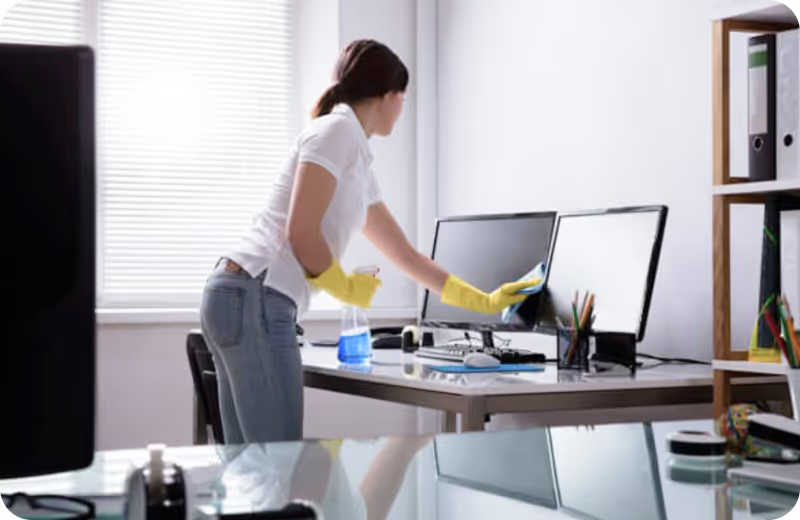
Disinfection and sterilization may sound interchangeable, but these terms have stark differences that are important for sanitary operations in hospitals versus schools. Both deal with the cleaning of any microbial contamination, getting rid of harmful microorganisms that may pose dangers to the human body.
The difference between disinfection and sterilization is most essential to industries where microbial life should be next to zero, like healthcare, commercial food safety, and research laboratories. You can easily disinfect a restaurant enough to be safe for dining, but the same level of sanitation in restaurants is not enough to sterilize hospitals.
In this article, we'll be discussing what makes disinfection and sterilization. Both kill microorganisms, but the level they kill off bacterial spores differ greatly, which is a necessary distinction when sanitizing medical facilities.
What is Disinfection?
Disinfection means to kill off microorganisms that may be harmful to the health through cleaning processes that involve chemical methods such as disinfecting with hydrogen peroxide, alcohol, bleach, or stronger chemicals. Disinfection is essentially a thorough cleaning procedure that should remove most pathogenic microorganisms.
However, disinfection is not enough to kill most vegetative bacteria. Unlike sterilization, disinfection focuses on removing contaminants. High-level disinfection is used in hospital surfaces to remove pathogenic organisms, but is not enough to clean medical instruments that come in direct contact with the body.
Disinfection is usually done in restaurants, schools, malls, and other commercial spaces. However, home disinfection is also a common practice when a household member has been infected with a contagious disease. Commercial spaces where people from all walks of life pass through each day are often disinfected at the start and end of operations.
Disinfection is particularly essential to the food and beverage industry as food safety standards must be observed to keep food from spoiling, and from passing germs from the kitchen to the customer. Schools are also key areas for disinfection as children are especially susceptible to getting sick from contaminated surfaces.
Disinfection is typically done through chemical processes, but there are other methods as well like heat disinfection and UV light disinfection. The most common way to disinfect commercial spaces is through the use of alcohol or bleach (sodium hypochlorite solution).
What is Sterilization?
On the other hand, sterilization is one of the decontamination processes where heat, radiation, or chemical sterilants are used in reducing harmful microorganisms as well as bacterial spores. Sterilization procedures are often multi-step processes that deal with cleaning, disinfection, and sterilization of inanimate objects.
Medical equipment, surgical instruments, and any medical device used in health care facilities all undergo sterilization either through steam sterilization or chemical sterilization process to kill off all microorganisms that may be lingering on the surface, even the non-harmful ones.
Because it is extremely important to have every piece of surgical equipment achieve sterilization, most of these items are kept under monitoring using chemical indicators that will notify personnel whether sterilization has been achieved for specific items.
Sterilization is often done in hospitals, care facilities, surgical and operating rooms, and more. However, sterilization is also required for research laboratories dealing with dangerous pathogens and vegetative bacteria such as disease institutes and the CDC.
Sterilization branches out to chemical sterilization, radiation sterilization, and heat sterilization depending on the properties of the material. Organic materials that do not react well to chemicals or heat can be sterilized through radiation, while biological culture media is sterilized through special cleaning solutions.
The Importance of Disinfection and Sterilization
While both sterilization and disinfection have the ability to remove the pathogens that could potentially make us sick, it is necessary to understand when to disinfect or sterilize a surface.
Killing off Harmful Microorganisms, Bacterial Spores
Disinfection is enough to kill most harmful organisms from contaminated surfaces, particularly after being handled by a sick individual. Disinfection can be done without advanced tools or equipment, and some common household cleaning supplies are also proper disinfecting solutions.
Sterilization is needed to kill off both harmful and non-harmful organisms as well as their spores. This is especially critical for operating rooms as all instruments, surfaces, and even garments must be sterilized to prevent the spread of diseases from patient to patient.
As a comparison, hospital operating rooms must be sterile at all times, but waiting rooms can go with a thorough, high-level of disinfection as these rooms don't typically come in direct contact with blood and internal fluids.
Preventing Infections from Microbial Contamination
In preventing infection of superficial wounds, disinfecting the wound and its surrounding area will greatly reduce the chances of bacteria festering in the open sore. However, with flesh wounds and in surgical settings, sterilization of all instruments and materials is a must to treat the sterile tissue.
Creating a Safe and Healthy Environment
Generally, disinfection is enough to create a safe and healthy environment in commercial spaces, offices, homes, and schools. Disinfection can remove the bacteria, germs, and viruses that can infect human bodies, and keep us safe from the usual pathogens.
However, when it comes to areas with high levels of uncommon diseases, these germ spores can only be killed off through sterilization. This is the reason for high monitoring of sterilization in healthcare, especially in hospitals that include a cocktail of different illnesses.
Disease Control
Both disinfection and sterilization processes are put in place for controlling the spread of diseases. Human society has come a long way in preventing the spread of diseases when compared to previous centuries.
We no longer have to fear preventable diseases like smallpox, plague, and more through our vaccinations and disease control efforts. Part of these efforts include proper cleaning and sanitation standards that are strictly monitored in disease hotspots to ensure that these areas do nothing to spread the disease further.
Preventing Infection
With the current pandemic situation, knowing the difference between a sterile environment versus a disinfected one will help to prevent infections from viruses such as Covid-19. More and more households, offices, and commercial areas are beginning to understand how important it is to disinfect surfaces regularly.
As part of our efforts to stop the spread of infection, make sure you have frequent disinfection in your home and offices. For full disinfection services, we at Luce SG can guarantee the removal of all microbial contaminants in your workplace!
Check out our website for more details on our professional cleaning and disinfection services!





























